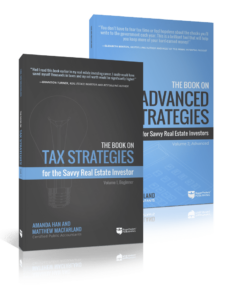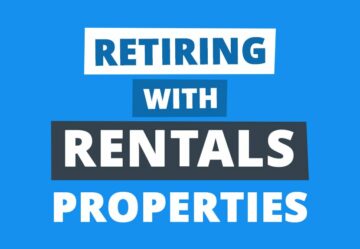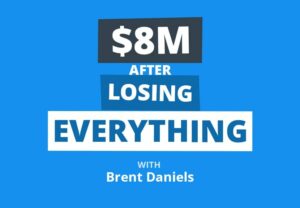
Real estate investors talk about their real estate portfolios a lot. Even in challenging markets, we’re always chasing the next home run—the next amazing off-market deal whispered to us by someone in our network.
But what other kinds of investments do real estate investors keep? Especially during periods of turbulence, how do they make the full financial picture all pencil out?
We asked three real estate investors, each at different levels of investing, where else they keep their money. Here’s what they said.
Rachel Richards currently owns two buildings, six units, and 10 syndications (her portfolio brings in about $6,000/month in profit).
It’s best to not have all your eggs in one basket. My strategy is mostly built around real estate, but I believe in income diversification: having as many streams of income as possible. That way, if one income stream goes away, the rest will keep me afloat.
For example, I currently make $4,000/month in profits from book royalties and $3,000/month in profits from evergreen online courses. I also have affiliate income, interest income, and dividend income. They say that the average millionaire has seven streams of income.
BiggerPockets: Can you share an example of when this diversification has come in handy?
During COVID, many of our tenants couldn’t pay or paid late. We waived all late fees during that time and helped them apply for rental assistance. In March 2020, I made $10,000 in profits. In April 2020, I made $0 in profits.
I didn’t lose money, but I didn’t make money either. And the only reason I wasn’t panicking during that time was because I had my other income streams. You never want to operate out of a place of panic or desperation as a business owner or real estate investor, and diversification will help with that.
BiggerPockets: What other investments (non-real estate) do you invest in?
I have a couple of IRAs invested in the stock market and an HSA invested in the stock market. I believe in passive, low-cost index funds and ETFs. So they are invested in things like VTSAX [Vanguard Total Stock Market Index Fund], VTI [Vanguard Total Stock Market Index Fund ETF], IJR [iShares Core S&P Small-Cap ETF], and so forth. Research shows that passive index funds (like the S&P 500) consistently outperform actively managed mutual funds. So why pay a mutual fund manager a higher fee to get a lower return?
Claire Johnston is an investor and Realtor in Minneapolis and currently owns three doors. One is a single-family, and the other is a duplex where she is currently house hacking. Her real estate investments gross about $4,000/month.
I love real estate because it gives me immediate cash flow and additional options beyond a traditional 401k/IRA to access my gains without the penalties from 401k early withdrawal. But real estate requires more management from me, and with a small portfolio, I am at greater risk of losing money in the short term if something happens to one of my properties [or] I have vacancies. Diversifying with my 401k/IRA gives me peace of mind that I am still on track long-term for retirement and negates some of the risks of investing in real estate.
BiggerPockets: Why is it important or necessary to diversify between real estate and other sources of investment income?
For me, it’s all about giving myself as many options as possible. I think of my 401k as a safe buffer that allows me to take more risk with my real estate investments without compromising my retirement savings. I have a 401k through my W-2 job (both Roth and traditional), an IRA that I rolled all my old jobs’ 401ks into, and an HSA—all invested in the most boring and “safe” low-cost index funds/target date funds.
BiggerPockets: Why these particular investments?
I read 24 personal finance books the year I turned 27. They all had slightly different advice, but the three consistent pieces of advice throughout all the books were:
1. Max out your 401k (or, at a bare minimum, contribute enough to max out your employer match).
2. Max out your HSA (this money grows tax-free).
3. Invest the money in those accounts in low-cost index funds or target date funds.
So that’s exactly what I have been doing. Oh, and the fourth piece of common advice was to live below your means so that you can do all of the above!
Jeremy Schneider is the co-founder of Nectarine, a marketplace that connects individual investors with advice-only financial advisors. Schneider owns one home but is invested in about $300,000 worth of syndication deals.
Real estate investing is a lot more work than index fund investing. Additionally, my personal skill set and experience is better suited to earning income in the digital world, so I focus my energy on that and keep my investing very simple and low-cost.
For a couple of years, I flipped homes with a friend, and we held one as an Airbnb for a year. It all went okay, but I didn’t experience exceptional returns and found it was a distraction from focusing on my strengths. If I were 25 with $10,000 in the bank and lots of capacity to hustle, I’d probably think differently and want to start building up a real estate portfolio.
BiggerPockets: Why is it important or necessary to diversify between real estate and other sources of investment income?
I only invest in things that meet two main criteria:
- It pays you income while you own them.
- It’s likely to go up in value.
The two big categories that meet that bar are real estate and the stock market. There are plenty of people who have gotten wealthy with just one or the other, but most rich people I know do both.
There’s a famous quote from economist and Nobel Prize winner Harry Markowitz: “Diversification is the only free lunch in investing.” If you can get equally expected good returns with less risk, that’s a big win.
BiggerPockets: Why index funds?
Owning an index fund guarantees you the growth and profits of all the companies that make up the economy. I know investors love the term passive income, but investments largely vary in their degree of passivity. However, index funds are as close as you can get: Spend about five minutes on a brokerage website putting your money in and buying them, then do nothing forever.
BiggerPockets: What percentage of your net worth is real estate vs. other investments?
My net worth of about $4.6 million breaks down as follows:
| Investment | Amount | Percentage of Total |
| Stocks and bonds | $2,743,824 | 59.1% |
| Primary home | $1,117,000 | 24.1% |
| Business equity | $327,287 | 7.1% |
| Real estate syndications | $309,858 | 6.7% |
| Angel investments | $112,955 | 2.4% |
| Cash | $29,000 | 0.6% |
| Crypto | $2,161 | 0.0% |
Note By BiggerPockets: These are opinions written by the author and do not necessarily represent the opinions of BiggerPockets.
- SEO Powered Content & PR Distribution. Get Amplified Today.
- PlatoData.Network Vertical Generative Ai. Empower Yourself. Access Here.
- PlatoAiStream. Web3 Intelligence. Knowledge Amplified. Access Here.
- PlatoESG. Carbon, CleanTech, Energy, Environment, Solar, Waste Management. Access Here.
- PlatoHealth. Biotech and Clinical Trials Intelligence. Access Here.
- Source: https://www.biggerpockets.com/blog/how-the-best-real-estate-investors-diversify-their-portfolios
- :has
- :is
- :not
- :where
- ][p
- $3
- $4.6 million
- $UP
- 000
- 10
- 2020
- 24
- 25
- 27
- 401K
- 500
- a
- About
- access
- Accounts
- actively
- Additional
- Additionally
- advice
- advisors
- Affiliate
- All
- allows
- also
- always
- am
- amazing
- an
- and
- Apply
- April
- ARE
- around
- AS
- Assistance
- At
- author
- average
- away
- Bank
- bar
- basket
- because
- been
- believe
- below
- BEST
- Better
- between
- Beyond
- Big
- book
- Books
- border
- Boring
- both
- breaks
- Brings
- brokerage
- buffer
- Building
- built
- business
- business owner
- but
- Buying
- by
- CAN
- Can Get
- Capacity
- categories
- challenging
- Close
- Co-founder
- come
- Common
- Companies
- compromising
- connects
- consistent
- consistently
- contribute
- Core
- Couple
- courses
- Covid
- criteria
- Currently
- Date
- deal
- Deals
- Degree
- desperation
- different
- digital
- digital world
- diversification
- diversify
- dividend
- do
- doing
- doors
- down
- during
- each
- Early
- Earning
- Economist
- economy
- Eggs
- either
- else
- energy
- enough
- equally
- especially
- estate
- ETF
- ETFs
- Even
- Evergreen
- exactly
- example
- exceptional
- expected
- experience
- famous
- fee
- Fees
- finance
- financial
- five
- Focus
- focusing
- follows
- For
- forever
- forth
- found
- Fourth
- Free
- friend
- from
- full
- fund
- fund manager
- funds
- Gains
- get
- gives
- Giving
- Go
- Goes
- good
- greater
- gross
- Grows
- Growth
- guarantees
- hacking
- had
- handy
- happens
- Have
- having
- Held
- help
- helped
- her
- Hidden
- higher
- Home
- Homes
- House
- How
- However
- HTTPS
- i
- if
- important
- in
- Income
- index
- individual
- interest
- into
- Invest
- invested
- investing
- investment
- Investments
- investor
- Investors
- IRA
- iShares
- isn
- IT
- Job
- jpg
- just
- just one
- Keep
- Know
- largely
- Late
- less
- levels
- LG
- like
- likely
- live
- long-term
- lose
- losing
- Lot
- lots
- love
- low-cost
- lower
- lunch
- made
- Main
- make
- make money
- managed
- management
- manager
- many
- March
- march 2020
- Market
- marketplace
- Markets
- Match
- max
- me
- means
- Meet
- million
- Millionaire
- mind
- minimum
- minutes
- money
- more
- most
- mostly
- mutual
- mutual fund
- mutual funds
- my
- myself
- necessarily
- necessary
- net
- network
- never
- next
- nobel prize
- None
- nothing
- of
- oh
- Okay
- Old
- on
- ONE
- online
- only
- open
- operate
- Opinions
- Options
- or
- Other
- our
- out
- Outperform
- own
- owner
- owns
- paid
- Panic
- particular
- passive
- passive income
- Pay
- pays
- peace
- People
- percentage
- periods
- personal
- Personal Finance
- picture
- piece
- pieces
- Place
- plato
- Plato Data Intelligence
- PlatoData
- Plenty
- portfolio
- portfolios
- possible
- prize
- Pro
- probably
- Profit
- profits
- properties
- Putting
- quote
- Read
- real
- real estate
- realtor
- reason
- relative
- represent
- requires
- research
- REST
- retirement
- return
- returns
- Rich
- Risk
- risks
- Rolled
- round
- royalties
- s
- S&P
- S&P 500
- safe
- Said
- Savings
- say
- set
- seven
- Share
- she
- Short
- Shows
- Simple
- SIX
- skill
- slightly different
- small
- So
- some
- Someone
- something
- Sources
- spend
- start
- Still
- stock
- stock market
- Strategy
- stream
- streams
- strengths
- syndication
- T
- Take
- Talk
- Target
- term
- than
- that
- The
- their
- Them
- then
- There.
- These
- they
- things
- think
- this
- those
- three
- Through
- throughout
- time
- to
- Total
- track
- traditional
- true
- turbulence
- Turned
- two
- units
- us
- value
- Vanguard
- very
- vs
- waived
- want
- was
- Way..
- we
- wealthy
- Website
- went
- were
- What
- when
- while
- WHO
- why
- will
- win
- winner
- with
- withdrawal
- without
- Work
- world
- worth
- written
- year
- years
- you
- Your
- zephyrnet












